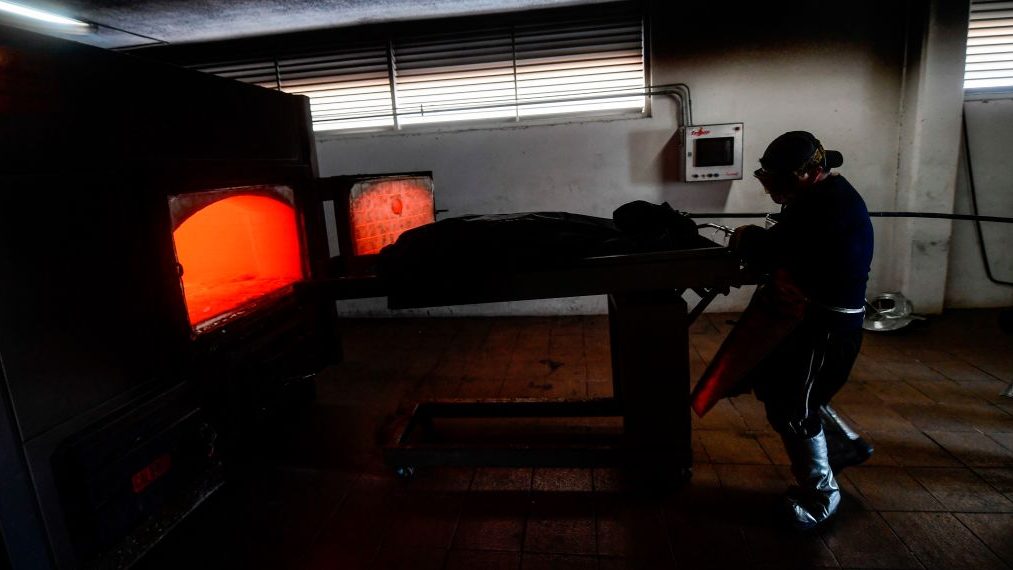🔄 Click here to see the most recent entries
13 posts
8 hours ago
Study: 6 in 10 Americans don't know when or where to get the vaccine
By Andrea Díaz
About 6 in 10 Americans don't know when or where to get the coronavirus vaccine, says a new report from the Kaiser Family Foundation.
The report, based on surveys conducted between January 11 and 18 with 1,563 participants, also suggests that Americans are experiencing a variety of emotions as a result of the chaotic launch of the vaccine.
Half said they were "frustrated," a third said they felt "confused," and almost a quarter were "angry."
The Biden administration has faced a great challenge in administering vaccines.
Most Americans do not know when or where they can get vaccinated, including older Americans, who are already eligible to receive a vaccine in a growing number of states, "said KFF President and CEO Drew Altman in a statement from press on Friday.
"Understandably, a large number of people are frustrated, angry and confused."
The survey also found that 55% of the essential workers they interviewed said they have enough information about where to get a vaccine, but don't have enough information to know when they will be eligible for their vaccines.
Additionally, 21% of interviewed healthcare workers who have not yet been vaccinated said they do not have enough information on how to get a coronavirus vaccine.
The report also found that black, Hispanic and low-income adults are among the groups least likely to say they have enough information about vaccines.
At least 6 in 10 said they don't have enough information about where to get vaccinated, and at least two-thirds said they don't have enough information about when they can get vaccinated.
About half (48%) of the public expect vaccine distribution to "improve" under President Biden, while most others expect the situation to "stay more or less the same" (36%).
Relatively few (12%) expect the distribution to "get worse," the survey said.
Regardless of personal political stance, the majority of survey participants (60%) rated their state government's vaccine performance as fair or poor.
11 hours ago
France will require a negative test for EU travelers
By Pierre Bairin
As of Sunday, people entering France from other European Union countries must submit a negative PCR test taken within the last 72 hours.
These new rules do not apply to "essential travel" or to people who cross the border every day to work in France, or to those who work in transport.
The move was announced in a press release from the Elysee Palace office on Friday.
The statement also reiterates that France had already imposed stricter measures for travelers from countries outside the EU's borders (including the UK), who must not only submit a negative PCR test taken within 72 hours, but also be in quarantine for seven days.
They must also take a second test at the end of the quarantine period.
12 hours ago
The United States reports almost 189,000 new cases
By Joe Sutton
The United States reported 188,952 new coronavirus infections and 3,955 virus-related deaths on Thursday, according to data from Johns Hopkins University.
By count, the national totals now stand at 24,627,882 cases, including 410,105 deaths.
Totals include cases from all 50 states, the District of Columbia and other U.S. territories, as well as repatriated cases.
Vaccines: At least 37,960,000 doses of vaccines have been distributed and at least 17,546,374 doses have been administered, according to the US Centers for Disease Control and Prevention.
12 hours ago
Germany exceeds 50,000 deaths
By Claudia Otto and Nadine Schmidt
Germany has recorded a total of 50,000 coronavirus deaths since the outbreak began in the country, according to data released by the Robert Koch Institute (RKI) for infectious disease prevention and control on Friday.
The country reported 859 new COVID-19-related deaths and 17,862 additional new infections in the last 24 hours, bringing the total number of infections to 2,106,262
As of Thursday, Germany had vaccinated 1,401,693, roughly 1.7% of its population, according to the latest RKI data.
Among those vaccinated are 341,768 residents of homes for the elderly and about 468,814 members of the medical staff, according to data collected from the country's federal states.
On Thursday, German Chancellor Angela Merkel urged Germans to take the spread of the most contagious new variant of the coronavirus "very seriously".
(Photo by ODD ANDERSEN / AFP via Getty Images)
Earlier in the week, Germany extended a national lockdown until February 14, implementing stricter rules, including making FFP2 masks mandatory in public spaces and forcing German companies to allow employees to work from home until mid-March, when it is possible.
13 hours ago
Mexico reports 1,803 deaths in one day
By Kiarinna Parisi
(Photo by PEDRO PARDO / AFP via Getty Images)
The Ministry of Health of Mexico reported 22,339 new positive cases of covid-19 and 1,803 new deaths related to the disease.
They also report that at least 1,277,978 people have recovered from the new coronavirus.
In Mexico, since the beginning of the pandemic, 1,711,283 positive cases of covid-19 and 146,174 deaths related to the disease have been confirmed.
13 hours ago
The cost of PCR tests in Central America
By Mario Medrano
(Photo by STANLEY ESTRADA / AFP via Getty Images)
The cost of COVID-19 screening tests varies from country to country, depending on its type and the entity that performs it, according to a survey with CNN correspondents in Central America.
In El Salvador, the virus detection test costs an average of US $ 160. In Costa Rica, the test costs between US $ 89 and US $ 99 depending on where it is performed, since it can be done in public centers and private.
In Honduras, travelers must perform the test in private laboratories at a cost of US $ 28 for the rapid test and US $ 120 for the PCR.
In Panama, the rapid test is offered for US $ 45 and the PCR for US $ 100. While in Guatemala, the authorities offer the test at the airport at a cost of US $ 25.
National travel agencies such as Aeromundo and Premiere shared information from statements published by the governments of Ecuador, Peru, Chile, Colombia, Guatemala, the United States and Canada.
Since January, these countries have requested the negative PCR test for coronavirus to enter their territory.
In the case of Peru and Canada, they also contemplate days of isolation or quarantine.
As of January 19, the Nicaraguan health authorities reported 6,204 cases of covid-19 and 168 deaths from that cause.
In contrast, the independent Covid-19 Citizen Observatory adds 12,404 verified suspected cases and 2,908 deaths as of January 13.
13 hours ago
Alert for cost of tests in Nicaragua
By Mario Medrano
The Superior Council of Private Companies (Cosep) and the National Chamber of Tourism of Nicaragua (Canatur) blamed the sanitary provisions of the Ministry of Health for the coronavirus pandemic for the delay in the reopening of commercial airline operations.
Since last July, the government has asked travelers for the negative result of a real-time PCR test for covid-19, carried out in a period no longer than 72 hours before entering the country.
The requirement was extended to airline crew members by order of civil aeronautical authorities.
This Wednesday, the president of Cosep, Michael Healy, asked the Nicaraguan government to review the cost of the coronavirus detection test and make prevention measures more flexible to normalize the operation of airlines in the country.
14 hours ago
Quito faces new restrictions due to the increase in cases
By Ana María Cañizarez
The mayor of Quito, Jorge Yunda, reported this Thursday at a press conference that the "lack of health awareness" of some population groups has put the hospital system of the Ecuadorian capital at risk, which, according to official figures, registers the highest number of infections throughout Ecuador.
“It is the most populated city with the most inhabitants, so there is an imminent danger and we do not have availability in the health system.
Right now it's difficult to find a place in intensive care units, ”Yunda warned.
The official reported that the authorities and medical professionals who monitor the evolution of covid-19 in Quito gave him a technical-scientific report that concludes that "there is a high increase in cases in the capital."
For this reason, he reported that the city's Emergency Operations Committee established new restrictions to prevent a new overflow of the health system and that they will be in force from January 22 to February 7.
Among the measures announced by the mayor is the restriction of activities in shopping centers, markets, restaurants, dining rooms and the like from 6:00 am to 10:00 pm and prohibits the sale of alcoholic beverages from 10:00 pm on weekends.
In addition, Yunda announced the vehicle restriction from 11:00 pm to 4:00 am from Monday to Saturday.
No vehicle may circulate, except for the exceptions authorized for essential personnel and those authorized during the pandemic.
“I appeal to the citizens because we have noticed a relaxation due to the fatigue of the pandemic or the affectation of mental health.
We must take immediate corrections to the irresponsibility of the population, "emphasized the mayor.
According to the Municipality of Quito, the new restriction measures will be evaluated and corrected in a daily monitoring to analyze the epidemiological curve in the Ecuadorian capital.
14 hours ago
Former Brazilian president Lula da Silva recovers from covid-19
By Kiarinna Parisi
Archive image.
(Credit: MIGUEL SCHINCARIOL / AFP via Getty Images)
Luiz Inácio Lula da Silva, former president of Brazil, was diagnosed with covid-19 in Cuba and is recovering satisfactorily, as confirmed by the former president himself through a statement on his Twitter account.
The statement indicated that, during a follow-up medical check-up, Lula da Silva was diagnosed with lung lesions consistent with covid-19-associated bronchopneumonia.
But, it has shown a satisfactory recovery, according to the statement.
"The former president did not require hospitalization, as did other members of his team.
Only the writer Fernando Morais was in the hospital for 14 days due to pulmonary complications, "added the statement.
The former president returned to Brazil on Wednesday after spending a month in Cuba.
There he planned to participate in a documentary on Latin America directed by Oliver Stone.
Lula's wife and seven other members of his team also tested positive.
All were kept in isolation while they got over the illness.
“I am ready to receive the vaccine as soon as we have vaccines for everyone.
I am still waiting for my turn with a lot of willingness to receive it as soon as possible.
And as long as people are not vaccinated, I will continue to use my mask, respecting social distancing and using antibacterial, "explained the former president.
14 hours ago
The president of Argentina receives the Russian vaccine Sputnik-V
By Florencia Trucco
(Photo by Marcos Brindicci / Getty Images)
Argentina's President Alberto Fernández received his first dose of the Russian covid-19 vaccine Sputnik-V on Thursday, according to a statement from his office.
"The president reaffirmed the safety and efficacy of the vaccine and reiterated that his priority is for it to reach the majority of Argentines in the shortest time possible," the statement read.
Fernández, 61, received the dose at the Posadas Hospital in the province of Buenos Aires.
The National Administration of Medicines, Food and Technology of Argentina (ANMAT) recommended the use of the vaccine to the Ministry of Health on Wednesday, for use in people over 60 years of age.
Argentina received a shipment of 300,000 doses of Sputnik-V on December 24.
14 hours ago
Colombia exceeds 50,000 deaths
By Stefano Pozzebon and Heather Yamour
(Photo by JOAQUIN SARMIENTO / AFP) (Photo by JOAQUIN SARMIENTO / AFP via Getty Images)
Colombia surpassed 50,000 covid-19-related deaths on Thursday as the country struggles to contain a dramatic increase in cases.
The country's Health Ministry reported 395 new deaths due to the coronavirus, bringing the total number of lives lost to 50,187.
The total number of cases in the country since the start of the pandemic is 1,972,345.
Colombia's largest urban areas have been applying strict social distancing measures since the beginning of the year in an effort to curb the spread of the virus.
Intensive care units in Colombia's capital Bogotá have been above 90% capacity for the past 10 days.
Colombia expects to start vaccinations in mid-February, Health Minister Fernando Ruiz told CNN.
14 hours ago
Rio de Janeiro cancels carnival parade
By CNN Spanish
Rio de Janeiro Mayor Eduardo Paes announced this Thursday that he is canceling the most famous carnival parade in Brazil, which had been postponed from February to July this year due to the coronavirus pandemic.
“I have never hidden my passion for carnival and the clear vision that I have of the economic importance of this cultural event for our city.
However, it seems pointless to me to imagine at this point that we will be able to celebrate carnival in July, ”Paes wrote on his Twitter account.
He argued that the celebration requires "great preparation" on the part of public bodies and samba associations and institutions.
Something that he defined as "impossible" to carry out at that time.
"Certainly in 2022 we will be able (all duly vaccinated) to celebrate life and our culture with all the intensity that we deserve," he said in another tweet.
The mayor did not specify if it will be postponed to another date this year.
15 hours ago
Basilica of Higüey closed on the Day of the Virgin of Altagracia
By Jessica Hasbun
For the first time in 50 years, the Basilica of Higüey, one of the busiest shrines in the Dominican Republic, did not open its doors to the devotees of the Virgen de la Altagracia due to the coronavirus pandemic.
Every January 21, thousands of faithful and pilgrims gather in the city of Higüey, in the east of the country, to pay tribute to the protective mother of the Dominican people.
This year, in an atypical celebration, the vigil was broadcast virtually.
For Francia Huichara, the authorities had to limit access without closing the basilica to the public.
«You have to leave it open because that is set by God and what God puts is not closed.
Not for everyone to enter, "he said.
Meanwhile, Belkis Martínez valued the restrictions as positive, but said that he needed to pay homage in person to the virgin.
Something he has done for decades with his family.
"I would have liked to be present, but since everything is already virtual, we are going to adapt to the rules," added Martínez.
Meanwhile, President Luis Abinader, who usually attends the Higüey Basilica with his family, regretted that this time it could not be done.
"I would have liked a lot, but the pandemic limits us," he said.
The most recent bulletin from the Ministry of Health indicates that the Dominican Republic accumulates 199,672 cases of covid-19 and 2,482 deaths due to the disease.
Pandemic






/cloudfront-eu-central-1.images.arcpublishing.com/prisa/2C5HI6YHNFHDLJSBNWHOIAS2AE.jpeg)
/cloudfront-eu-central-1.images.arcpublishing.com/prisa/W33JSXVPKRF7FMDYEETPSPNNKY.jpg)
/cloudfront-eu-central-1.images.arcpublishing.com/prisa/OMA4UFCHWBCAJBF6ZSPZWE4ARQ.jpg)
